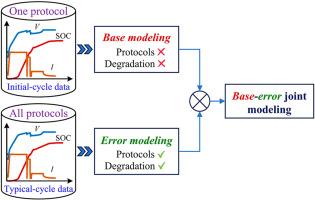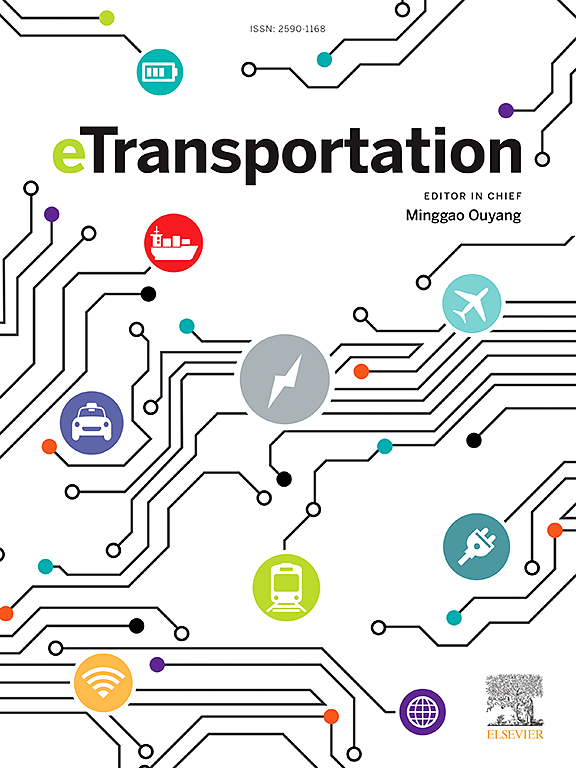多种快速充电协议下全电池寿命的充电状态估计:轻量级基础误差联合建模框架
IF 17
1区 工程技术
Q1 ENERGY & FUELS
引用次数: 0
摘要
在不同的多级恒流(MCC)快速充电协议中,准确的在线估计电池的充电状态(SOC)具有重要的意义。在这项工作中,我们开发了一个面向轻量级训练的数据驱动基础误差联合建模框架来填补这一研究空白。通过基于深度学习的初始周期数据训练和基于轻量级机器学习的典型周期数据训练,我们只提取了大约1%的整个电池数据,用于数据驱动的基础误差联合建模。考虑到SOC的时间依赖性,通过简单的滤波器结构进一步组合短期安培小时,以保证最终的SOC估计精度。来自46个电池的8种不同MCC快速充电协议的公共电池退化数据集的验证表明,我们的框架允许快速数据驱动的基本误差联合建模,训练时间仅为1分钟,其中各种MCC快速充电协议下SOC估计的平均绝对误差和平均均方根误差在电池整个使用寿命期间大致低于0.3%。我们的工作首次揭示了通过极少量数据训练的联合数据驱动模型在考虑各种MCC快速充电协议和电池退化状态的情况下进行准确的SOC在线估计的可能性,并为多场景电池老化诊断和电压动态预测提供了一种非常简洁而高效的解决方案。本文附带的代码可从https://github.com/szzhang96/A-light-weighted-training-oriented-data-driven-base-error-joint-modeling-method-for-SOC-estimation获得。本文章由计算机程序翻译,如有差异,请以英文原文为准。

State-of-charge estimation over full battery lifespan under diverse fast-charging protocols: A lightweight base-error joint modeling framework
Accurate state-of-charge (SOC) online estimation during various multi-stage constant current (MCC) fast-charging protocols over battery entire lifespan holds significant importance. In this work, we develop a lightweight-training oriented data-driven base-error joint modeling framework to fill this research gap. Through deep learning-based initial-cycle data training and lightweight machine learning-based typical-cycle data training, we only extract approximately 1 % of whole battery data for data-driven base-error joint modeling. With consideration of SOC time-dependency, short-term Ampere-hour is further combined via a simple filter structure to guarantee final SOC estimation accuracy. The validation, derived from a public battery degradation dataset comprising 8 different MCC fast-charging protocols from 46 cells, demonstrates that our framework allows rapid data-driven base-error joint modeling with training time only about l min, where both average mean absolute error and average root mean square error of SOC estimation during various MCC fast-charging protocols over battery entire lifespan are roughly below 0.3 %. Our work, for the first time, reveals the possibility of joint data-driven model trained via extremely few data on accurate SOC online estimation with consideration of various MCC fast-charging protocols and battery degradation status, and also offers a pretty concise but efficient solution for multi-scenario battery aging diagnosis and voltage dynamics forecast. The code accompanying this work is available at https://github.com/szzhang96/A-light-weighted-training-oriented-data-driven-base-error-joint-modeling-method-for-SOC-estimation.
求助全文
通过发布文献求助,成功后即可免费获取论文全文。
去求助
来源期刊

Etransportation
Engineering-Automotive Engineering
CiteScore
19.80
自引率
12.60%
发文量
57
审稿时长
39 days
期刊介绍:
eTransportation is a scholarly journal that aims to advance knowledge in the field of electric transportation. It focuses on all modes of transportation that utilize electricity as their primary source of energy, including electric vehicles, trains, ships, and aircraft. The journal covers all stages of research, development, and testing of new technologies, systems, and devices related to electrical transportation.
The journal welcomes the use of simulation and analysis tools at the system, transport, or device level. Its primary emphasis is on the study of the electrical and electronic aspects of transportation systems. However, it also considers research on mechanical parts or subsystems of vehicles if there is a clear interaction with electrical or electronic equipment.
Please note that this journal excludes other aspects such as sociological, political, regulatory, or environmental factors from its scope.
 求助内容:
求助内容: 应助结果提醒方式:
应助结果提醒方式:


